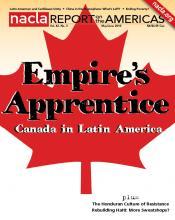Report
Maxwell A. Cameron and Jason Tockman
Throughout the Honduran crisis, Canada moved in lockstep with the United States. Doing so clashed with Canada’s frequently stated commitment to multilateralism and democracy.
Sheila Katz and Gauri Sreenivasan
Sheila Katz and Gauri Sreenivasan
Although Canada and Colombia signed a free trade agreement in 2008, the Canadian Parliament has still not ratified it, thanks largely to an effective civil society campaign.
Latin America is the most important destination for Canadian mining capital. Efforts to regulate the industry, which is associated with all manner of social and environmental disruptions, have thus far been stymied.
Ricardo Grinspun and Yasmine Shamsie
Both Conservative and Liberal governments in Ottawa have expounded their faith in neoliberalism. With its new policy of re-engaging Latin America, the Harper government remains undaunted.
Behind Canada's do-gooder facade in the Americas is a country torn in contradictory directions, not all of which are particularly benevolent. The government of Conservative prime minister Stephen Harper has increasingly undermined Canada’s traditional reputation and has sent an unfortunate message to the region: Tory Canada is the Empire’s apprentice.
Sheila Katz and Gauri Sreenivasan
Canada is a major source of bilateral democracy assistance in the hemisphere. In the case of Bolivia, Canadian efforts have not been used to undermine the leftist MAS government; however, a more interventionist model may be in the making.

